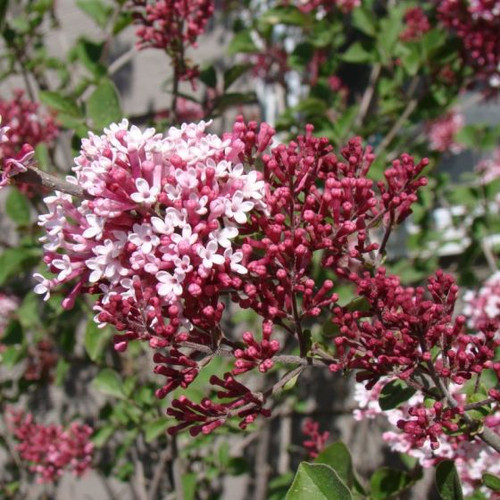Product Overview
QUICK FACTS
| Common Name: | Lilac |
| Hardiness Zone: 3-7S/8W | Exposure: Sun |
| Find your zone? | Blooms In: May |
| Height: 12-15' | Spacing: 8-12' |
| Read our Growing Guide | Ships as: BAREROOT 12-18" |
| Fragrance: Yes | Deer Resistance: Yes |
'Pocahontas' is a special Lilac that you will treasure for the profusion of fragrant flowers that appear earlier (by about two weeks) than those of one of its parents, the Common Lilac (Syringa vulgaris). Flower buds of 'Pocahontas' are on the maroon side of purple and open into single, violet blooms. For the rest of the season, plants display healthy green leaves that turn a bronzy red in fall before dropping.
Bred by Frank Skinner in Manitoba, Canada, 'Pocahontas' is a very hardy cross between Syringa obalata subspecies dilatata and S. vulgaris. First introduced in 1936, it continues to be used in the breeding program of the U.S. National Arboretum.
Lilacs are among the best-known classic spring-flowering shrubs. For reliable bloom and sweet fragrance, generally before Memorial Day, these sturdy shrubs are in a class by themselves. Most Lilacs prefer full sun and neutral to slightly alkaline soil.
Latin Name Pronunciation: sir-ing'guh
Plant Syringa in full sun (S. laciniata varieties are the exception and will perform well in partial shade). Immature lilacs produce flowers with lighter coloration; it may take 4–6 years for their true color to show.
All Lilacs require well-drained soil with pH close to neutral. Add lime if your soil is extremely acid. Fertilize once, in early spring, with a light application of an organic seaweed extract, fish emulsion, or slow-release fertilizer. Prune as necessary after bloom in spring.
S. vulgaris varieties are prone to powdery mildew, which generally appears in late summer. Mildew disfigures the leaves to varying degrees, but seems to have little effect on the vigor of the plant.







